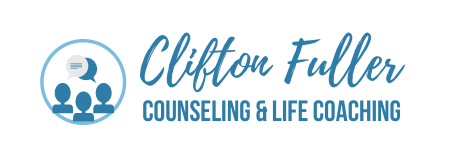
Resources & Articles
It’s new! Check out Clifton Fuller Counseling’s new YouTube Channel!
(Please be patient with us, as posting on the channel is new for us, but we’re learning and will be uploading new videos regularly)!
Dyslexia, My story. (Running In Lead Boots)
A person with dyslexia may feel that they are running with lead boots because our brains don’t process written graphics like others. Still, they should realize they can also be highly gifted people and bring insights into our world that others would never even consider or dream of! October is Dyslexia Awareness Month! If dyslexia is something you or someone in your life experiences, resources are available. Read more here…
Differences: Counselor and Coach
People often ask what the difference is between a counselor and a coach. How do you know if you need a counselor or a coach, or a specific kind of counselor, or a specific kind of coach. Counseling addresses mental health issues, include a diagnosis, and is usually covered by insurance. Coaching addresses goal setting, life improvement, and is not covered by insurance, is self-pay and does not have a diagnosis. Read this article to discover more.
Games & Hobbies: Benefits of Taking Time to Have Fun!
Children learn by playing games, and as adults, we often forget that we do, as well. Games keep us mentally alert, learning, and problem-solving, regardless of age or physical health. Read more about the unexpected benefits of gaming, games, and hobbies and learn how educators, parents, and mental health professionals are using and encouraging games and play for life.
Pets & People: Who’s Helping Who?
Having a pet can help us physically and emotionally as we care for them, and they care for us. They can reduce stress, lower blood pressure, help us exercise, and bring us joy! But before adding a pet to our lives, we must also understand both the responsibilities and benefits of owning and caring for a pet. Read more here…
Stimming: When Restlessness Has Purpose
“Stimming” is a term that indicates self-stimulatory or self-soothing behavior. We all stim, but to different degreesThe public has become more conscious of stimming due to its increased awareness of the Autism Spectrum and Attention Deficit Hyperactivity Disorders. Some stimming behaviors are considered appropriate or acceptable, such as things most of us do, but others that interfere with learning are destructive (to a person or object) or can result in social exclusion, rejection, or stigma. Read more…
Agoraphobia: Trapped by our fears
Agoraphobia, which comes from the Greek term for “fear of the marketplace," is a type of anxiety disorder where a person is afraid to leave their perceived safe or “home” environment. We usually associate agoraphobia with fear of leaving our house, however, it can be other places where a person also feels safe. Read more and find resources here…
Exercise’s Natural Effects on Mental Health!
Exercise is a way for us to control so much of our lives. Exercise helps us strengthen our body, control our appetite, increase stamina and energy, and have time to ourselves or have fun with family and friends. But did you know it also helps our mental health? What a great deal! If you begin exercising 5 minutes a day of easy exercise, then move up to an increasing number of minutes per day, then add cardiovascular or weight exercise as you become stronger, then you’re able to easily adjust exercise routines as you need for your personal needs, age, weight, or ability. Don’t try to ‘find time’ for exercise; “Make” time for exercise. You’re worth it!
Oppositional Defiant Disorder: Rebels Without A Cause.
Oppositional Defiant Disorder (ODD) is a childhood behavioral disorder marked by defiance and disobedience to authority figures, irritability, aggression, and vindictiveness. It is difficult for the person with ODD (whether child, adolescent or adult) if they do not learn effective coping skills as it results in difficulty in relationships, rejection by others, difficulty in life, trouble with authority figures, and anger control. Read more…
Worry: the Hidden Thief of Life’s Time and Energy
We all worry occasionally, but there are ways to control it so it doesn’t impact our lives negatively. Worry is life’s hidden thief, stealing our time and energy. Life is much better spent thinking about relationships, things, and efforts that enhance or bring joy into our lives. Read more for some tips to use to control worry in your life.
ADHD
ADHD (Attention Deficit Hyperactivity Disorder) is one of the most commonly diagnosed developmental disorders, affecting roughly 7% of children and teenagers. However, misdiagnosis or crossover with similar dysfunctions often skewed those numbers. It is estimated that 25-40% of children and adults with dyslexia are left undiagnosed with ADHD…or undiagnosed with ADHD who also have dyslexia. May adults only discover they have ADHD when they are adults as they’ve learned how to compensate (or mask) ADHD for most of their lives. Read more…
Bullying
Bullying may be physical, emotional or social intimidation. Both children and adults are affected by bullying. Bullying differs from what some call ‘taunting’, as bullying is repeated and aggressive intimidation of another that the bully considers to be weaker (either physically or socially). Bullying can have long-term effects on those bullied and there are ways to teach about, prevent, and react to bullying.
What Does “Catfishing” Mean?
There are two types of ‘catfishing’. One is great! It’s where we catch a fish and bring it home for supper. The other isn’t good at all. It’s when a deceptive person presents themselves in a certain way in order to deceive others. The first type of fishing is fun and can feed a family. The second is malignant and destroys others. In life, we will run into ‘catfishers’ who, if given opportunity, can cause harm and are dangerous. Read our article on catfishing, how to protect yourself against those who would try to trap you in their nets or webs of deceit, and resources to help you nagivate oftentimes murky waters.
Personality & Relationship Tests
Do personality tests help individuals and couples know themselves better? Read article to find out more!
Developing Attitudes of Gratitude
Learning to be grateful and express thankfulness changes our brain! It also helps us mentally, physically and emotionally. It attracts others to us, and makes our lives happier. It is possible to practice gratitude, even in difficult times and we’ll share some important tips that may just change the way you think about the compelling issue.
Laughter Heals!
Want to live longer? Have better health? Deal more effectively with a long-term or critical illness? Then let's learn about the healing power of laughter!
Anxiety!
Anxiety is the #1 mental health issue affecting people worldwide. Even though 1 in 13 people will suffer from anxiety, only 10% of those needing counseling will be able, or willing, to access needed therapy. This generally leads to depression, decreased physical health and increased agitation.


















